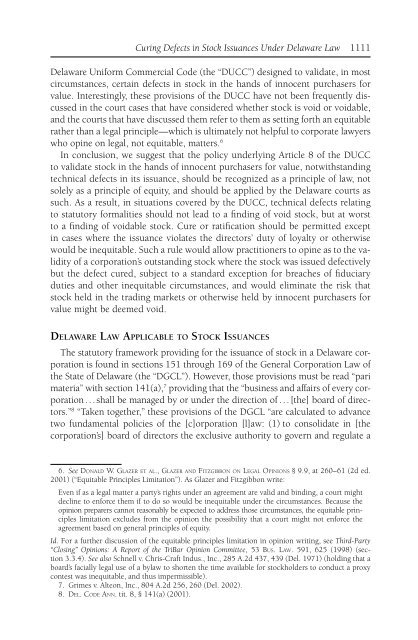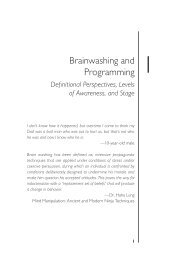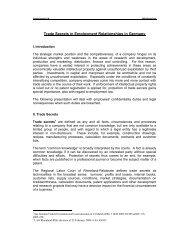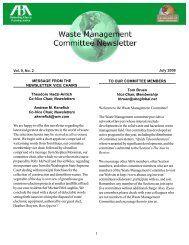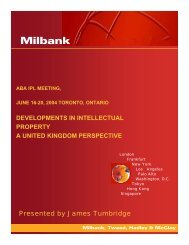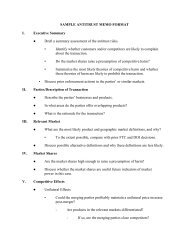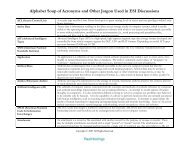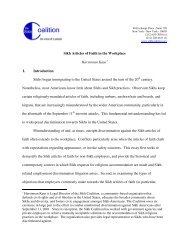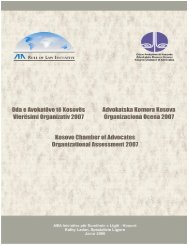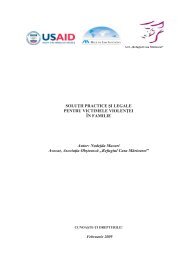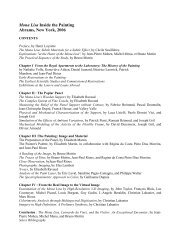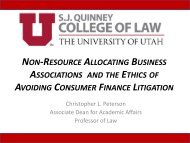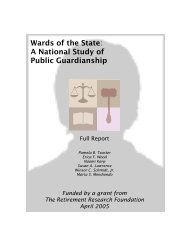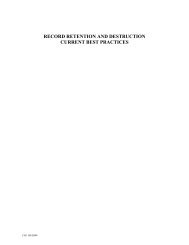Curing Defects in Stock Issuances - American Bar Association
Curing Defects in Stock Issuances - American Bar Association
Curing Defects in Stock Issuances - American Bar Association
You also want an ePaper? Increase the reach of your titles
YUMPU automatically turns print PDFs into web optimized ePapers that Google loves.
<strong>Cur<strong>in</strong>g</strong> <strong>Defects</strong> <strong>in</strong> <strong>Stock</strong> <strong>Issuances</strong> Under Delaware Law 1111<br />
Delaware Uniform Commercial Code (the “DUCC”) designed to validate, <strong>in</strong> most<br />
circumstances, certa<strong>in</strong> defects <strong>in</strong> stock <strong>in</strong> the hands of <strong>in</strong>nocent purchasers for<br />
value. Interest<strong>in</strong>gly, these provisions of the DUCC have not been frequently discussed<br />
<strong>in</strong> the court cases that have considered whether stock is void or voidable,<br />
and the courts that have discussed them refer to them as sett<strong>in</strong>g forth an equitable<br />
rather than a legal pr<strong>in</strong>ciple—which is ultimately not helpful to corporate lawyers<br />
who op<strong>in</strong>e on legal, not equitable, matters. 6<br />
In conclusion, we suggest that the policy underly<strong>in</strong>g Article 8 of the DUCC<br />
to validate stock <strong>in</strong> the hands of <strong>in</strong>nocent purchasers for value, notwithstand<strong>in</strong>g<br />
technical defects <strong>in</strong> its issuance, should be recognized as a pr<strong>in</strong>ciple of law, not<br />
solely as a pr<strong>in</strong>ciple of equity, and should be applied by the Delaware courts as<br />
such. As a result, <strong>in</strong> situations covered by the DUCC, technical defects relat<strong>in</strong>g<br />
to statutory formalities should not lead to a fi nd<strong>in</strong>g of void stock, but at worst<br />
to a fi nd<strong>in</strong>g of voidable stock. Cure or ratifi cation should be permitted except<br />
<strong>in</strong> cases where the issuance violates the directors’ duty of loyalty or otherwise<br />
would be <strong>in</strong>equitable. Such a rule would allow practitioners to op<strong>in</strong>e as to the validity<br />
of a corporation’s outstand<strong>in</strong>g stock where the stock was issued defectively<br />
but the defect cured, subject to a standard exception for breaches of fi duciary<br />
duties and other <strong>in</strong>equitable circumstances, and would elim<strong>in</strong>ate the risk that<br />
stock held <strong>in</strong> the trad<strong>in</strong>g markets or otherwise held by <strong>in</strong>nocent purchasers for<br />
value might be deemed void.<br />
DELAWARE LAW APPLICABLE TO STOCK ISSUANCES<br />
The statutory framework provid<strong>in</strong>g for the issuance of stock <strong>in</strong> a Delaware corporation<br />
is found <strong>in</strong> sections 151 through 169 of the General Corporation Law of<br />
the State of Delaware (the “DGCL”). However, those provisions must be read “pari<br />
materia” with section 141(a), 7 provid<strong>in</strong>g that the “bus<strong>in</strong>ess and affairs of every corporation<br />
. . . shall be managed by or under the direction of . . . [the] board of directors.”<br />
8 “Taken together,” these provisions of the DGCL “are calculated to advance<br />
two fundamental policies of the [c]orporation [l]aw: (1) to consolidate <strong>in</strong> [the<br />
corporation’s] board of directors the exclusive authority to govern and regulate a<br />
6. See DONALD W. G LAZER ET AL., GLAZER AND FITZGIBBON ON LEGAL OPINIONS § 9.9, at 260– 61 (2d ed.<br />
2001) (“Equitable Pr<strong>in</strong>ciples Limitation”). As Glazer and Fitzgibbon write:<br />
Even if as a legal matter a party’s rights under an agreement are valid and b<strong>in</strong>d<strong>in</strong>g, a court might<br />
decl<strong>in</strong>e to enforce them if to do so would be <strong>in</strong>equitable under the circumstances. Because the<br />
op<strong>in</strong>ion preparers cannot reasonably be expected to address those circumstances, the equitable pr<strong>in</strong>ciples<br />
limitation excludes from the op<strong>in</strong>ion the possibility that a court might not enforce the<br />
agreement based on general pr<strong>in</strong>ciples of equity.<br />
Id. For a further discussion of the equitable pr<strong>in</strong>ciples limitation <strong>in</strong> op<strong>in</strong>ion writ<strong>in</strong>g, see Third-Party<br />
“Clos<strong>in</strong>g” Op<strong>in</strong>ions: A Report of the Tri<strong>Bar</strong> Op<strong>in</strong>ion Committee, 53 BUS. LAW. 591, 625 (1998) (section<br />
3.3.4). See also Schnell v. Chris-Craft Indus., Inc., 285 A.2d 437, 439 (Del. 1971) (hold<strong>in</strong>g that a<br />
board’s facially legal use of a bylaw to shorten the time available for stockholders to conduct a proxy<br />
contest was <strong>in</strong>equitable, and thus impermissible).<br />
7. Grimes v. Alteon, Inc., 804 A.2d 256, 260 (Del. 2002).<br />
8. DEL. CODE ANN. tit. 8, § 141(a) (2001).


